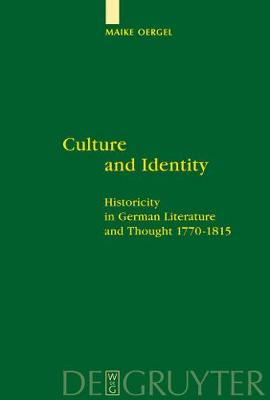This interdisciplinary study examines the impact of the emerging awareness of historicity on the concepts of modernity, identity, and culture as they developed in German thought around 1800. It shows how thisawareness determined the German notion of the priority of cultural identity. Key texts from Sturm und Drang, WeimarClassicism, German Romanticism andGerman Idealism, including Goethe's Faust I and Wilhelm Meisters Lehrjahre, are contextualised in relation to post-Enlightenment debates on historicity and modernity. The study traces the modification of the Enlightenment concepts of perfectibility and universal ideals to accommodate the new notion of temporal particularity and impermanence. This is achieved by embedding these once static concepts in a historical process that is powered by a self-prompting internal dialectic. Through synthetic absorption within the historical succession the dialectical process allowsfor the continuity of values, while leaving room for discontinuity and difference by relying on oppositional successions. The study reveals close connections between the intellectual concerns, the literary ambitions, and the endeavours to construct a modern German identity during this period, whichsuggests a far greater intellectual coherence of the Goethezeit regardingintellectual challenges and objectives than has been previously assumed.
- ISBN10 3110199971
- ISBN13 9783110199970
- Publish Date 22 August 2008 (first published 1 January 2006)
- Publish Status Active
- Publish Country DE
- Imprint De Gruyter
- Format eBook
- Pages 308
- Language English
- URL https://degruyter.com/isbn/9783110199970
